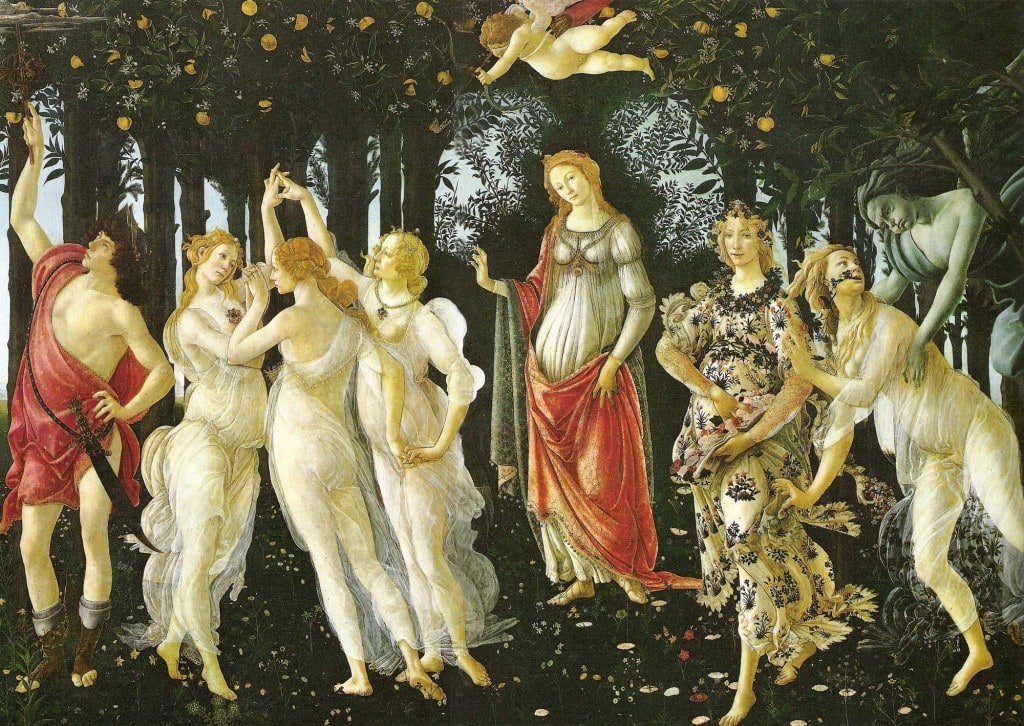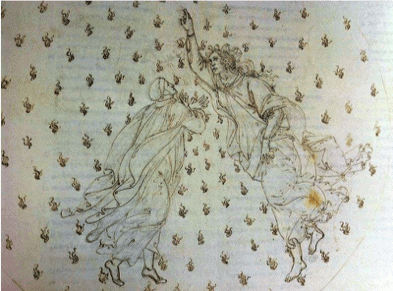In this Great Year 2025, we turn our inner gaze and ears to the Divine Legend of the Muses (see 2025 Solar Rituality and Ephemerides), by sowing, in resonating celestial Dates, the various chapters of the related text The Academy of Muses (which will be published in 4 languages/4 TPS blogs in September 2025), starting on this Christmas night with its
Introduction
Homer invokes the Muse in himself as a first sovereign act:
The wrath of Peleus’ son… O Goddess, sing! … (Iliad, Proem)
The Goddess inspires the “OM cantor” (etymon of Homer) and initiates our culture:
“The literature and culture of the entire West … start in the first verse of the Iliad by invoking the Muse; in the beginning, then, it is the highest, sacred voice of the mousiké.
… Its importance in the cosmic order is essential: it fulfils the superb glory of the divine work of creation and represents its soul.”[1]
At the dawn of a new Epoch,[2] we want to rediscover the Muse as the primary Model to imitate and follow, to remember the grace of our highest essence and destiny, to navigate the heavenly ocean. For it is the Muse who sings and dances the Music of the Spheres, heavenly or inner: the Muses “guard the secret of a sacred dimension that exceeds ordinary life. They are like a flowing fluid, they are like water, not only because water is the principle of life, but also because water is the mind itself: still, crystal-clear water that, like a mountain lake, reflects the ideas and forms of thought, or water that ripples and churns, threatening and gloomy, in the changing whirlwind of emotions. The Muses are mental waters, superior and celestial waters, in which the images of the world and of being appear. … The voice of the divine maidens does not merely celebrate what has been created, but orders it and, in ordering it, adorns it: it endows it with meaning and beauty. The word is not a supplement that is added to what exists, but a power that fulfils the world and makes it be in all its splendour. By pronouncing and singing the things that inhabit the universe, the voice of the Muses gives them substance and value.”[3]
According the esoteric Tradition understanding, the Muse is then not an invention of the Greek genius, although it has the merit of having conjured or remembered her some 2,800 years ago, but a highest Entity or Energy whose vibrationis “the soul of creation” to which it “gives substance and value.” Muse is a real Name and Symbol for the Essence of all things. As will be seen below, in occult and more precise terms, the Muse is the Living Substance of the spiritual Triad, that level and Principle of Reality that wills, loves and thinks all Forms, from the universal cosmos to the atomic.
From another perspective and as a harbinger of Pythagoras’ Science of Harmonics, the Muse is a Master of sound wisdom and a Mother of rebirth to higher resonances: “The feature that marks the nature of every being is a word-songwith its own intonation and pitch. Therefore he who knows the sound-word of each thing and knows how to understand its music also possesses the fundamental knowledge to act upon reality and to modify it: the knowledge of the word is the secret power of a sound that becomes action, moving and transforming, at will, every existing datum. The very body of the gods is interwoven with meters and songs. It follows that he who has perfect mastery of that sound wisdom can, in turn, ascend to heaven: with the right rhythm and the right song, one can transform one’s transient nature and become immortal.” (DSM)
To penetrate the mystery of the Muse and the reason for her ‘recognition’ at the dawn of our Western culture, it is co-measured to “begin by questioning what their name [or sound] encompasses. … ‘Μούσα‘ (Muse) is said to derive from a word of Lydian origin, móus or ‘source’: the goddesses with the marvellous voice would, to all intents and purposes, have the nature of ‘aquatic’ creatures, like the Naiads, the nymphs that inhabit fountains and riverbanks (Vatican Mythographs3,8,22). But Muse could also be connected to the root from which terms such as manthánein, ‘to learn’, mnéme, ‘memory’, or mens, ‘mind’ derive: the maidens of Olympus and Mount Helicon would be, from this point of view, powers of thought. Plato, for his part, believed that the name contains the same meaning as the verb mósthai, ‘to aspire’, ‘to desire’, ‘to seek’ (Cratylus 406 a): the Muse would be the very yearning for knowledge, the tension of the search, the desire for truth and the path that leads to it. Diodorus Siculus, offering a further cue, suggests a juxtaposition to the sphere of the mysteries (Historical Library 4,7): Muse would derive from múein, ‘to initiate’, because – in a similar way to the Eleusinian rituals – the Muses preside over a sacred initiation, giving mortals access to a higher and different form of knowledge, opening up to them the way to the most beautiful and admirable things. …
Their power extends not only to the most beautiful conceptions of thought, but also to the symphonic interweaving of all the things that are in the universe (Iamblichus, Life of Pythagoras 46).[4] For, according to Pythagoras, the nature of cosmos also has its own music and sound. … That is why, according to Pythagoras, the Muses are not only divine maidens singing in the abode of Zeus, but the very voice of planets and stars. And it is towards such celestial melody that all human music should strive, in order to be in symphonic accord with the Hyperborean light[v] of Apollo and the synchronous dance of the daughters of Memory. From the soft glow of the paradise of the North, as well as from the terse splendour of Olympus, the infallible archer, accompanied by the Muses, beckons and points the way up to the stars, so that humans may harmonise with the divine rhythm of cosmic order.” (DSM)
Per aspera ad astra. (“Through adversity to the stars” – Paracelsus)
The Muses are the Way that rises to the stars; they are the Music of the Spheres that moves to sail the Waters of Life on the winged and indestructible sailboat of the Intellect of Love.
To such an ascending spiral to the sacred Temple of Harmony we give the platonic Name[6] of:
Academy of Muses.
*
I pray Memory and her daughters
to grant me a happy outcome
for blind are the minds
of men who without the Muses
seek the profound path of wisdom.
(Pindar, Paeans 7 b)
*
As we begin this journey into the Hall of heavenly Wisdom, let us invoke them with Dante, the Supreme Poet:
O Muses, O high genius, now assist me !
O memory, that didst write down what I saw,
Here thy nobility shall be manifest !
(Inferno, canto II, verses 7-9 – Translations from Digital Dante).
O YE, who in some pretty little boat,
Eager to listen, have been following
Behind my ship, that singing sails along,
Turn back to look again upon your shores;
Do not put out to sea, lest peradventure,
In losing me, you might yourselves be lost.
The sea I sail has never yet been passed;
Minerva breathes, and pilots me Apollo,
And Muses nine point out to me the Bears.









